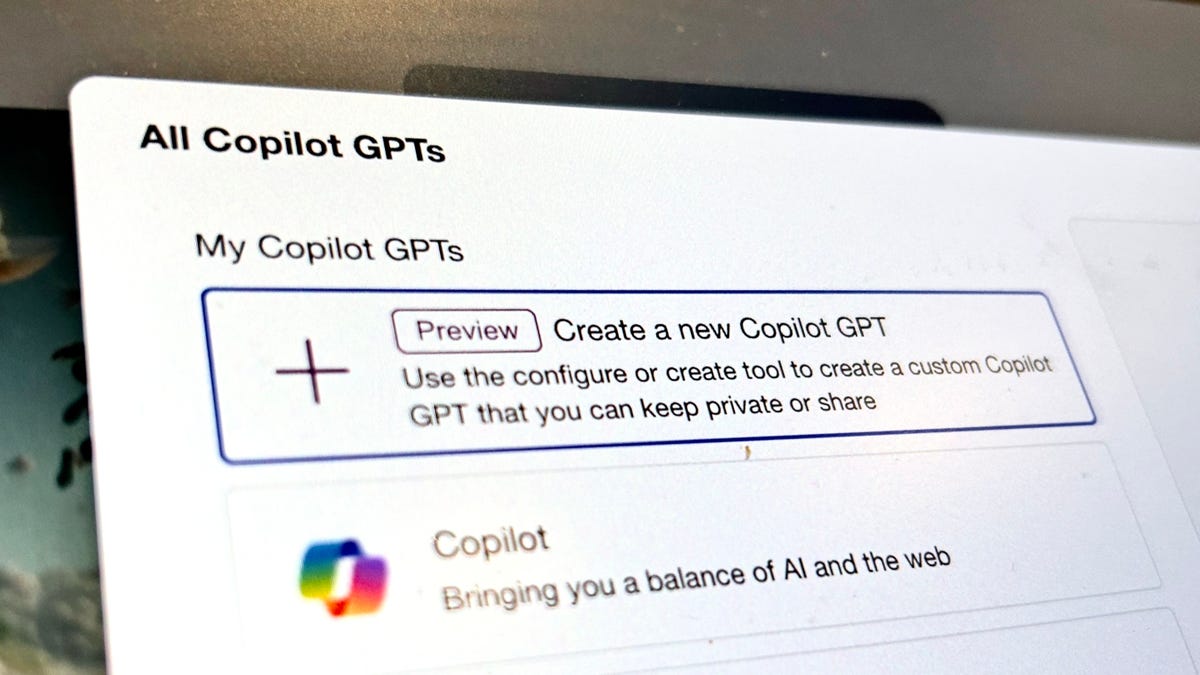- How Reddit's new AI ad tools help brands join the conversation
- Broadcom resets private cloud strategy with VMware Cloud Foundation 9.0
- This Dreame is one of the best robot vacuums money can buy, especially at over half off
- Essential commands for Linux server management
- AI-Ready Infrastructure: A New Era of Data Center Design
Microsoft scraps Copilot Pro GPT Builder and removes all user data

Are you one of the people who used the GPT Builder in Microsoft’s AI-based Copilot Pro? If so, the feature is now gone, at least for consumers.
Microsoft permanently squashed the tool on July 10 and removed all GPTs — those created by the company and its customers — from July 10 through July 14. In a nod toward privacy, any data associated with or collected by the GPTs should also have been removed.
Also: How to use Copilot Pro to write, edit, and analyze your Word documents
In June, Microsoft announced that it was retiring the GPT Builder as part of its CopIlot Pro subscription.
Launched just four months ago in mid-March, Copilot’s GPT Builder worked similarly to OpenAI’s ChatGPT Plus GPT Builder. Both tools let you create your own custom GPT chatbots to use yourself or share with others. Creating your own task-specific chatbot this way requires no coding skills or knowledge as the tool talks you through the process.
The difference is that the ChatGPT Plus GPT Builder lets you use your GPTs privately, share them with specific people, or publish them to the GPT store. With Copilot Pro’s GPT Builder, you could use them only privately or share them with specific people.
Why kill off the tool after only four months of life? Here’s Microsoft’s explanation:
“We are continuing to evaluate our strategy for consumer Copilot extensibility and are prioritizing core product experiences, while remaining committed to developer opportunities,” the company said on the support page. “To this end, we are shifting our focus on GPTs to Commercial and Enterprise scenarios and are stopping GPT efforts in consumer Copilot.”
Also: Microsoft Copilot vs. Copilot Pro: Is the subscription fee worth it?
This makes it sound as if custom GPTs and the GPT Builder may have a future for commercial and enterprise customers, though Microsoft hasn’t elaborated on this possibility. Otherwise, the tool may have simply failed to catch on with subscribers, and the company might have decided it was no longer worth the time and effort to support it.
In the meantime, what do you do if you’ve created custom Copilot GPTs? You should have already backed them up. For that, you would’ve opened your custom GPT in Edit mode and selected the Configure tab. You’d then copy the instructions and paste them somewhere else. If you haven’t backed up your GPTs, the deadline has passed, so you’re out of luck at this point.
Companies with generative AI products have tried to earn revenue by selling paid subscriptions with premium features. Beyond OpenAI and its ChatGPT Plus plan, Google markets a Gemini Advanced subscription. These two plans and Copilot Pro each cost $20 a month.
Also: What caused the great CrowdStrike-Windows meltdown of 2024? History has the answer
In comparison with the perks offered by other subscriptions, the main benefit to Microsoft’s Copilot Pro is AI for Microsoft 365 on the desktop and on the web. This means you can use AI to write, revise, and analyze documents in Word, emails in Outlook, presentations in PowerPoint, and data in Excel.
Is the retirement of its GPT Builder a sign that Microsoft is losing faith in the consumer version of Copilot Pro? That’s difficult to say. But it is telling that the company’s support page offers steps on how to cancel your Copilot Pro subscription.

